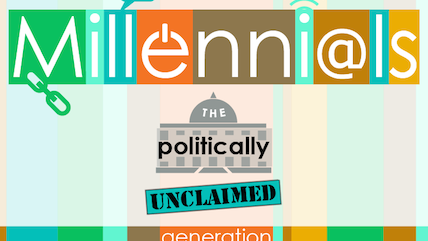53% of Millennials Would Vote for a Socially Liberal, Fiscally Conservative Candidate

Reason-Rupe has a new survey and report out on millennials—find the report here.
A majority—53 percent—of millennials say they would support a candidate who described him or herself as socially liberal and economically conservative, 16 percent were unsure, and 31 percent would oppose such a candidate.
Interestingly, besides libertarians, liberal millennials are the most supportive of a libertarian-leaning candidate by a margin of 60 to 27 percent. Conservative millennials are most opposed (43% to 48% opposed).
A libertarian-leaning candidate would appeal to both Democratic and Republican voters. For instance, 60 percent of Hillary Clinton voters, 61 percent of Rand Paul voters, 71 percent of Chris Christie voters, and 56 percent of those who approve of President Obama all say they would support a fiscally conservative, socially liberal candidate.
Registered voters are also more likely to favor (58%) this kind of non-traditional candidate than non-voters (48%).
Support for such a candidate also increases with educational attainment. Forty-nine percent of those with a high school degree or less would support a socially liberal, economically conservative candidate, compared to 63 percent of those with post-graduate degrees.
Religious millennials are far less likely to support a libertarian-leaning candidate. Among those who say religion is very important to them, 43 percent would oppose this non-traditional candidate, and 44 percent would support. Among those who say religion is not important to them, 58 percent would support a libertarian-leaning candidate, and 24 percent would oppose.
While partisanship and voting intention often vary by race and ethnicity, this is less so for a libertarian-leaning candidate. Fifty-five percent of both white and Latino millennials would support such a candidate, while 30 percent would oppose. Slightly fewer African-American and Asian American millennials would support the candidate, by a margin of roughly 46 percent in support to 37 percent opposed.
The fact that a socially liberal, fiscally conservative candidate mainly attracts liberals over conservatives indicates that social issues rather than economics largely drive millennials' political judgments. It also suggests millennials are more socially liberal than they are economically liberal.
To learn more about millennials, check out Reason-Rupe's new report.


Show Comments (5)